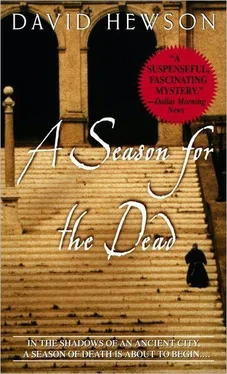David Hewson - A Season for the Dead
Здесь есть возможность читать онлайн «David Hewson - A Season for the Dead» весь текст электронной книги совершенно бесплатно (целиком полную версию без сокращений). В некоторых случаях можно слушать аудио, скачать через торрент в формате fb2 и присутствует краткое содержание. Жанр: Старинная литература, на английском языке. Описание произведения, (предисловие) а так же отзывы посетителей доступны на портале библиотеки ЛибКат.
- Название:A Season for the Dead
- Автор:
- Жанр:
- Год:неизвестен
- ISBN:нет данных
- Рейтинг книги:3 / 5. Голосов: 1
-
Избранное:Добавить в избранное
- Отзывы:
-
Ваша оценка:
- 60
- 1
- 2
- 3
- 4
- 5
A Season for the Dead: краткое содержание, описание и аннотация
Предлагаем к чтению аннотацию, описание, краткое содержание или предисловие (зависит от того, что написал сам автор книги «A Season for the Dead»). Если вы не нашли необходимую информацию о книге — напишите в комментариях, мы постараемся отыскать её.
A Season for the Dead — читать онлайн бесплатно полную книгу (весь текст) целиком
Ниже представлен текст книги, разбитый по страницам. Система сохранения места последней прочитанной страницы, позволяет с удобством читать онлайн бесплатно книгу «A Season for the Dead», без необходимости каждый раз заново искать на чём Вы остановились. Поставьте закладку, и сможете в любой момент перейти на страницу, на которой закончили чтение.
Интервал:
Закладка:
She considered the idea. “I’m sorry. The way I remember it he entered the room in a rush. The first time he said those words from Tertullian he was well past everybody else. Even when he spoke loudly they wouldn’t hear. The second time was different. But…”
Nic Costa thought about the kind of money the Vatican could spend on security and felt a sudden and urgent need to go back to the place where he had last seen Hugh Fairchild’s skin lying on an old mahogany desk.
“I understand. I’m sorry. These must seem very stupid questions.”
“Not at all. They seem very intelligent ones. As intelligent as anyone could ask in the circumstances. I wish I could be more help.”
Rossi had been right. It would have been awkward with him in the room.
Sara Farnese was a baffling mix of strength and timidity. The more she was surrounded by people, the less she would divulge.
He put his notebook in his pocket and got up.
“Would you like a coffee, Mr. Costa?”
“Thanks,” he said, smiling. “But I have another appointment.”
“Will there be another time?”
“I hope we can clear this all up by tomorrow. There shouldn’t need to be another interview.”
He nodded toward the window and gave her his card, scribbling his home and mobile numbers on it. “Remember what I said about harassment. Call anytime and I’ll get someone to talk to them.”
She looked at the card, then placed it in her bag. “Thanks. I’ll bear that in mind.”
“Good. Oh…” It was an old trick but sometimes an effective one.
“I almost forgot. Do you know someone in the Vatican? Someone called Cardinal Denney?”
She shook her head and smiled, the fullest smile Costa had seen on her face. “I’m sorry. I’ve never heard of anyone of that name.”
“No problem.”
Sara Farnese was looking out of the window again, wistfully.
“Are you sure you don’t want to go outside for a little while?”
Costa asked. “A walk. You can’t stay here forever.”
She frowned at the world beyond her window. “I’m not sure I can face that right now.”
He looked at her and said, “Maybe…”
Ten minutes later the door to the apartment block in Vicolo delle Palline opened and the mob outside went wild. In spite of the heat the woman coming out of the building was dressed in a long, full raincoat. Big sunglasses obscured her features and a head scarf covered her hair. She pushed away the forest of TV mikes that were thrust into her face. She said nothing, keeping her head down, trying to look as anonymous as possible in the scrum of reporters clamoring for her attention.
Cameras flashed. Arms and elbows jostled for position. A reporter from one of the tawdrier magazines fell to the ground, winded by a sharp stab to the ribs. Another screeched as he was jostled out of position. One of the bigger hacks started to throw punches at a TV cameraman who was attempting to push him out of the way. The slender figure at the center of the mêlée was unable to avoid the photographers but remained silent throughout, pushing forward through the mass, dark glasses fixed firmly on the ground ahead.
Then the center of gravity shifted. The raincoat forced its way through the final barrier of bodies and was free in the cobbled street. The mob’s clamor diminished. This was not what was supposed to happen. Victims gave in eventually. They offered a sight of themselves or a few words in deference to the power of the pack. It was unknown for victims to reject the mob’s advances so completely, so successfully. One or two of the hacks wondered what to make of it, but then there was no time.
Sara Farnese began to run. The two arms of the raincoat started to pump. Her legs beat on the ground. The figure that eluded them now set up a pace, steady and deliberate, out beneath Il Pasette into the broad tourist street beyond, inviting them to follow.
The herd howled and was after her, without pausing to think about how odd this situation was. Close to an ice-cream stand in the Via dei Corridori they almost caught her. Then she picked up speed once more and was away, only just, until the pedestrian lights on the Piazza Pia turned red and a surging sea of cars rolled forward, horns hooting, drivers screaming at each other, a solid sea of metal blocking her way.
The figure turned and saw the mob on her heels, panting, unused to this kind of chase, determined to repay the effort by pinning her down in public, forcing her to remove the disguise, bellowing at her until she said something, anything to explain why three people died in her name, and in such crazy ways too.
The first hack, some way ahead of the rest, pounced, placing a firm hand on her shoulder. This was a mistake. A sharp fist stabbed him in the ribs, the breath went out of his body in an instant, and all he heard for his considerable pain was a low, half obscene curse.
The traffic was gridlocked in the wide piazza, a mass of overheated vehicles sending out a choking cloud of pollution into the humid air.
She watched the rest of the pack come close then turned, jumped, mounted the hood of a Lexus next to the curb and raced quickly across the road, leaping from car to car. The mob watched in anguished amazement. The hacks were out of breath. The photographers scarcely had the energy to lift their cameras. The TV crews were still struggling up the street wondering what was going on. It was just possible for them to see the conclusion once she had navigated the hoods, roofs, and trunks that filled the piazza.
Sara Farnese, who was, as far as they knew, a quiet, academic university professor, kicked hard on the pavement, like an athlete setting off for the race. She broke into her pace, a faster pace than she had used down the Via dei Corridori, one which was more natural to her. Then she disappeared past the squat rotund magnificence of the Castel Sant’Angelo sprinting like a pro, the raincoat flapping behind in the wind.
Five minutes later a skinny, scared-looking young woman from Kosovo, with a ten-month-old baby in her arms, sat outside the make-shift tent that was her home. It was on the wide footpath by the banks of the Tiber on the Tridente side, near the Ponte Cavour. She was astonished to see a man walking toward her, a slender man with a woman’s raincoat flapping around him. He wore a broad, self-amused smile and was somewhat out of breath.
The young woman held her child more tightly and retreated into the shade of the small, tattered tent. He was not a cop, surely, who would move her on again. Cops didn’t wear women’s raincoats. They didn’t smile like this, a nice smile, she realized, one that came from some happiness inside.
He stopped and crouched next to her, looking at the baby, breathing heavily. Then he took off the raincoat, bundled it up with a pair of expensive-looking sunglasses and a head scarf and gave them to her.
“Can you use these?” he asked.
She nodded.
The man reached into his pocket and pulled out a fifty-euro note. It was a lot of money. She knew what that meant.
“What do you want?” she said in what she knew was bad Italian. “I don’t…” She didn’t want to say any more. It was a lot of money.
“Don’t worry. It’s a family custom. My father told me to give something away twice every day,” he said in a warm, calm voice.
“Maybe one day I’ll be hoping someone does the same to me.”
She couldn’t take her eyes off the note in her baby’s tiny fingers.
It was more cash than she had seen in weeks. “A lot of money,” she said again.
“I told you. Twice a day. I was busy this morning, I missed out. You’re lucky. You get both.”
She smiled nervously. “I like being lucky.”
Nic Costa wondered how old she was. Probably no more than seventeen.
Читать дальшеИнтервал:
Закладка:
Похожие книги на «A Season for the Dead»
Представляем Вашему вниманию похожие книги на «A Season for the Dead» списком для выбора. Мы отобрали схожую по названию и смыслу литературу в надежде предоставить читателям больше вариантов отыскать новые, интересные, ещё непрочитанные произведения.
Обсуждение, отзывы о книге «A Season for the Dead» и просто собственные мнения читателей. Оставьте ваши комментарии, напишите, что Вы думаете о произведении, его смысле или главных героях. Укажите что конкретно понравилось, а что нет, и почему Вы так считаете.












